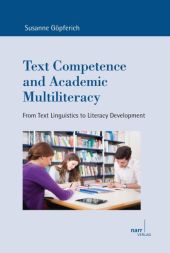 Neuerscheinungen 2015Stand: 2020-02-01 |
Schnellsuche
ISBN/Stichwort/Autor
|
Herderstraße 10
10625 Berlin
Tel.: 030 315 714 16
Fax 030 315 714 14
info@buchspektrum.de |

Susanne Göpferich
Text Competence and Academic Multiliteracy
From Text Linguistics to Literacy Development
1. Aufl. 2015. 321 S. 230 mm
Verlag/Jahr: NARR 2015
ISBN: 3-8233-6934-2 (3823369342)
Neue ISBN: 978-3-8233-6934-9 (9783823369349)
Preis und Lieferzeit: Bitte klicken
This book makes text linguistics fruitful for the development of text competence, i.e., the competence to read, write and learn from texts. Covering a range of topics from text linguistic foundations, text comprehension and comprehensibility assessment via text production processes and writing skills development to writing instruction and multiliteracy, it addresses challenges of the post-Bologna Reform era with its shorter degree programs, a larger student intake in universities and thus more heterogeneous entrance qualifications including writing skills. All of these factors make it necessary to foster students´ writing skills development in a more efficient and effective manner. How this can be implemented is the central question of this book. It is among the first to combine the US-American discourse on literacy development with the German discourse and addresses different audiences: Bachelor, master and post-graduate students interested in writing research will be introduced to pertinent theories and models on which their research can be based. Writing instructors, writing centre staff as well as subject-domain teachers will find guidance on how to improve their writing assignments and feedback practices. University administrators and program coordinators can inform themselves about best-practice approaches to writing instruction and support at different levels ranging from individual courses via entire programs to central support structures such as teaching and writing centres.
Contents
Introduction: The objective and scope of this book
Part I: Textlinguistic Foundations
1 Basic concepts
1.1 Text linguistics and text
1.2 Textuality
Part II: Text Comprehension and Text Comprehensibility
2 Levels of text processing
2.1 The legibility of texts
2.2 The readability of texts
2.3 Text comprehension as a constructive process
3 Text processing from a cognitive-science perspective
3.1 Propositional models of text processing
3.2 The structure of the human mind
3.3 The model of cyclic processing
3.4 Network models
3.5 Semantic macro-structures
3.6 Schema-theoretical approaches
3.7 The theory of mental models
3.8 Levels of comprehension
3.9 Concluding remarks
4 Text processing from the perspective of instructional psychology
4.1 The Hamburg psychologists empirical inductive approach
4.2 Groebens theoretical deductive approach
4.3 The Karlsruhe comprehensibility concept
5 Methods of comprehensibility assessment
5.1 Target-group-focused methods of comprehensibility assessment
Part III: Text Production
6 Writing (process) models
6.1 Hayes & Flowers (1980) writing process model
6.2 Hayes (1996) writing process model
6.3 Cooper & Matsuhashis (1983) writing process model
6.4 Günthers (1993) phrase-oriented production system (POPS)
6.5 Bereiter & Scardamalias (19987) models of beginners and advanced writers composing processes
6.6 An instruction-oriented writing process model
7 Writing competence development models
7.1 Writing development stages according to Bereiter (1980)
7.2 Kelloggs (2008) macro-stages of writing competence development
7.3 McCutchens s (1996) capacity theory of writing (development)
7.4 Writing competence development from the perspective of dynamic systems theory
7.5 Academic writing competence development from a corpus-linguistic product-oriented perspective
7.6 Alexanders (2003) Model of Domain Learning
7.7 The bioecological model of human development and its implications for modelling writing competence development
7.8 Summary
Part IV: Writing Instruction
8 Best-practice approaches to writing instruction
8.1 A theoretical framework for literacy pedagogy: multiliteracies
8.2 Teaching for transfer
8.3 Approaches to writing instruction at the macro-level
8.4 Approaches to writing instruction at the meso-level
8.5 Approaches to writing instruction at the micro-level
8.6 Writing-intensive seminars and the role of the teacher 207
8.7 Assignments for writing courses and writing-intensive seminars
8.8 Giving feedback
Part V: L1 vs. L2 writing
9 Writing in the L1 vs. writing in the L2
9.1 Differences between writing in the L1 and the L2
9.2 Translation into the L2 vs. composing in the L2
9.3 Translation from the L1 as a subprocess of writing in the L2
9.4 An explanatory model of EFL writing ability
9.5 Quality losses in L2 writing and the potential role of translation for writing instruction, text quality improvement and epistemic purposes
9.6 L2 writing pedagogy
References
Index


